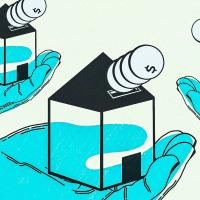In an attempt to radically alter the fast food industry, one Los Angeles based business is serving up healthy fast food at the same low cost as competitors like McDonald’s and Burger King.
The people at Everytable believe that healthy food isn’t a luxury product to be enjoyed by the most affluent, but rather, it is a human right that should be accessible to all. So they came up with a unique business model that enables them to provide cheap healthy food in low-income communities and food deserts.
Food Deserts in Los Angeles
What is a food desert? Food deserts are geographic areas in which access to groceries is scarce or limited. They’re typically found in low income areas, disproportionately affecting minority populations. Instead of having access to a grocery store a few miles from home, those living in food deserts may have to travel around 30 miles to find their nearest store.
Food deserts create food insecurity, when a person doesn’t know where their next meal will come from. In 2018, there were 37.2 million Americans living in food insecure homes. A majority of these families live below the poverty line, are Hispanic, African American, and households headed by single women.
It isn’t just an inconvenience for those living in food deserts; for many, it’s a serious health issue. Food deserts create an environment in which nutritional choices are stripped away, and those living in them are forced into unhealthy eating habits.
The fresh food that is offered in food deserts is often more expensive because it has to travel farther. It only worsens the issue when opportunistic, fast food restaurants like McDonald’s with low-priced, high-fat meals move into the most convenient locations for the food insecure.
When given the option between a 30-minute bus ride to the nearest grocery store for a $10 meal or a five-minute walk to the nearest fast food restaurant for a $5 meal, the choice isn’t much of a choice at all.
This is why Everytable set to work to make healthy fast food more accessible and affordable. Now, they’ve created an oasis amid L.A.’s most desperate food deserts.
Clare Fox, Everytable’s Vice President of Strategic Partnerships, explains the issue they set out to fix: “In Los Angeles county there are over one million Angelinos who experience food insecurity every day. We have twice as many people living in South L.A. as compared to West L.A., but we have half as many grocery stores. That has a huge impact on life expectancy.”
Fox went on to describe that children living in low-income communities have a shorter life expectancy than those in affluent areas. To further illustrate the issue, statistics show that 30% of children raised in South L.A. are obese compared to only 12% of children raised in the affluent area of Brentwood.
Food deserts and food insecurity are issues that have been plaguing socioeconomically disadvantaged areas for decades. So Everytable’s ultimate goal is to have 37,000 stores, the same number as McDonald’s, because they want to counteract the negative impact that the fast food industry has had on these communities, the country, and the world.
Rethinking the Fast Food Model
To offer healthy fast food at five dollars per meal, Everytable had to reimagine the standard fast food model. The process began with the kitchen. Instead of each location preparing its own food, all of Everytable’s meals are made in one central kitchen and then distributed across the city. This drastically cuts the cost of opening each new store by up 75%.
Everytable also launched vending machines which are low-cost to operate. This allows them to reach new markets in hospitals, college campuses, and apartment complexes. They also launched a subscription service for meal delivery.
But the most radical move Everytable has made is its sliding scale model for pricing. Their healthy fast food meals are priced differently based on the neighborhood in which they’re sold. For example, a meal that might cost $9 in Beverly Hills costs only $5 in Compton or Watts. This model creates equity in the availability of food and makes scaling possible.
Because of these innovative solutions, Everytable has gained quick success and notoriety. CEO Sam Polk took the business on the hit show Shark Tank and was able to strike a deal with guest Shark Rohan Oza for $1 million for 10% of the company.
Today, the same business model that helped Everytable disrupt L.A.’s fast food industry is now equipping them for success during the COVID-19 pandemic.
Expansion in the Midst of COVID-19
The model that Everytable created has perfectly positioned them to continue to grow, even in the midst of the ongoing pandemic. They recently formed a partnership with the City of Los Angeles to ensure that vulnerable groups like seniors and the homeless stay fed while the shelter-in-place order remains in effect.
Because of these changes, they’ve gone from selling 30,000 meals per week before the pandemic, to 150,000 meals per week. Everytable is primed to make more meals in the first three months of Los Angeles’ shelter-in-place order than they did in their first three years of business.
They’re also hiring 10 new employees per day and have added a kitchen that’s four times bigger than their original one to account for the increase in business. The demand for healthy fast food is growing, and Everytable is well prepared to meet that demand.
The business plans to take healthy food from a luxury item to a human right. What started as a restaurant chain aiming to redefine fast food and take on industry behemoths like McDonald’s is, in the process, creating chances for a healthier future in underserved communities and beyond.
For more interesting news about the people and ideas that are changing our world, subscribe to Freethink.


